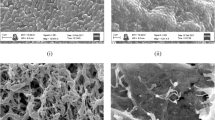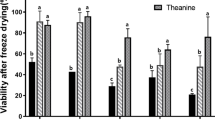Abstract
The ability of rice protein supplemented with various prebiotics to protect probiotic Lactobacillus plantarum TISTR 2075 upon freeze-drying and subsequent storage was determined. A combination of rice protein-fructooligosaccharide (RF) provided the best storage stability with the lowest specific rate of cell death (k) of 1.20 × 10−2 and 5.79 × 10−2 1/day during subsequent storage at 4 °C for 180 days and 30 °C for 90 days, respectively. Glass transition temperatures (Tg) of freeze-dried probiotic in various protectants were 14.2–25.4 and 42.9–50.1 °C after storage at 4 and 30 °C, respectively. The functional properties of freeze-dried probiotic with protectants remained stable. The presence of RF could effectively protect and enhance the probiotic functionality during exposure to gastrointestinal tract conditions. The pathogenic inhibition of freeze-dried probiotic against foodborne pathogens was not different from the active cells. Protective agents were able to maintain high degrees of cell surface hydrophobicity.



Similar content being viewed by others
References
Albadran HA, Chatzifragkou A, Khutoryanskiy VV, Charalampopoulos D. Stability of probiotic Lactobacillus plantarum in dry microcapsules under accelerated storage conditions. Food Res. Int. 74: 208–216 (2015)
Broeckx G, Vandenheuvel D, Claes IJJ, Lebeer S, Kiekens F. Drying techniques of probiotic bacteria as an important step towards the development of novel pharmabiotics. Int. J. Pharm. 505: 303–318 (2016)
Burnside E. Microencapsulation in the food industry. Academic Press: San Diego. 241–252 (2014)
Castro HP, Teixeira PM, Kirby R. Changes in the cell membrane of Lactobacillus bulgaricus during storage following freeze-drying. Biotechnol. Lett. 18: 99–104 (1996)
Chávez BE, Ledeboer AM. Drying of probiotics: Optimization of formulation and process to enhance storage survival. Dry. Technol. 25: 1193–1201 (2007)
Chotiko A, Sathivel S. Effects of enzymatically-extracted purple rice bran fiber as a protectant of L. plantarum NRRL B-4496 during freezing, freeze drying, and storage. LWT Food Sci. Technol. 59: 59–64 (2014)
Desmond C, Stanton C, Fitzgerald GF, Collins K, Paul Ross R. Environmental adaptation of probiotic lactobacilli towards improvement of performance during spray drying. Int. Dairy J. 12: 183–190 (2002)
Dhewa T, Pant S, Mishra V, Development of freeze dried synbiotic formulation using a probiotic strain of Lactobacillus plantarum. J. Food Sci. Technol. 51: 83–89 (2014)
Dianawati D, Mishra V, Shah NP. Survival of Bifidobacterium longum 1941 microencapsulated with proteins and sugars after freezing and freeze drying. Food Res. Int. 51: 503–509 (2013)
Dianawati D, Shah NP. Survival, acid and bile tolerance, and surface hydrophobicity of microencapsulated B. animalis ssp. lactis Bb12 during storage at room temperature. J. Food Sci. 76: M592–M599 (2011)
Gwak HJ, Lee, JH, Kim TW, Choi HJ, Jang JY, Lee S, Park HW. Protective effect of soy powder and microencapsulation on freeze-dried Lactobacillus brevis WK12 and Lactococcus lactis WK11 during storage. Food Sci. Biotechnol. 24(6): 2155–2160 (2015)
Halim M, Mohd Mustafa N, Othman M, Wasoh H, Kapri M, Ariff AB. Effect of encapsulant and cryoprotectant on the viability of probiotic Pediococcus acidilactici ATCC 8042 during freeze-drying and exposure to high acidity, bile salts and heat. LWT Food Sci. Technol. 81: 210–216 (2017)
Heidebach T, Först P, Kulozik U. Influence of casein-based microencapsulation on freeze-drying and storage of probiotic cells. J. Food Eng. 98: 309–316 (2010)
Hubálek Z. Protectants used in the cryopreservation of microorganisms. Cryobiology 46: 205–229 (2003)
Jofré A, Aymerich T, Garriga M. Impact of different cryoprotectants on the survival of freeze-dried Lactobacillus rhamnosus and Lactobacillus casei/paracasei during long-term storage. Benef. Microbes 6(3): 381–386 (2015)
Kalman DS. Amino acid composition of an organic brown rice protein concentrate and isolate compared to soy and whey concentrates and isolates. Foods 3: 394–402 (2014)
Karmas R, Pilar Buera M, Karel M. Effect of glass transition on rates of nonenzymic browning in food systems. J. Agric. Food Chem. 40: 873–879 (1992)
Lapsiri W, Bhandari B, Wanchaitanawong P. Stability and probiotic properties of Lactobacillus plantarum spray-dried with protein and other protectants. Dry. Technol. 31: 1723–1733 (2013)
Lapsiri W, Nitisinprasert S, Wanchaitanawong P. Lactobacillus plantarum strains from fermented vegetables as potential probiotics. Kasetsart J. (Nat. Sci.). 45: 1071–1082 (2011)
Lu Y, Huang L, Yang T, Lv F, Lu Z. Optimization of a cryoprotective medium to increase the viability of freeze-dried Streptococcus thermophilus by response surface methodology. LWT Food Sci. Technol. 80: 92–97 (2017)
Michida H, Tamalampudi S, Pandiella SS, Webb C, Fukuda H, Kondo A. Effect of cereal extracts and cereal fiber on viability of Lactobacillus plantarum under gastrointestinal tract conditions. Biochem. Eng. J. 28: 73–78 (2006)
Montel Mendoza G, Pasteris SE, Otero MC, Fatima Nader-Macías ME. Survival and beneficial properties of lactic acid bacteria from raniculture subjected to freeze-drying and storage. J. Appl. Microbiol. 116: 156–166 (2014)
Passot S, Cenard S, Douania I, Tréléa IC, Fonseca F. Critical water activity and amorphous state for optimal preservation of lyophilized lactic acid bacteria. Food Chem. 132: 1699–1705 (2012)
Rajam R, Anandharamakrishnan C. Microencapsulation of Lactobacillus plantarum (MTCC 5422) with fructooligosaccharide as wall material by spray drying. LWT Food Sci. Technol. 60: 773–780 (2015)
Reddy KBPK. Awasth SP, Madhu AN, Prapulla SG. Role of cryoprotectants on the viability and functional properties of probiotic lactic acid bacteria during freeze drying. Food Biotechnol. 23: 243–265 (2009)
Romano N, Tymczyszyn E, Mobili P, Gomez-Zavaglia A. Prebiotics as protectants of lactic acid bacteria. In: Probiotics, Prebiotics, and Synbiotics. Watson R and Preedy VR (ed). Academic Press, San Diego, CA, USA (2016)
Santivarangkna C, Kulozik U, Foerst P. Inactivation mechanisms of lactic acid starter cultures preserved by drying processes. J. Appl. Microbiol. 105: 1–13 (2008)
Santivarangkna C. Advances in Probiotic Technology. CRC Press, Boca Raton, FL. 286–310 (2015)
Santos MI, Gerbino E, Araujo-Andrade C, Tymczyszyn EE, Gómez-Zavaglia A. Stability of freeze-dried Lactobacillus delbrueckii subsp. bulgaricus in the presence of galacto-oligosaccharides and lactulose as determined by near infrared spectroscopy. Food Res. Int. 59: 53–60 (2014)
Savedboworn W, Kerdwan N, Sakorn A, Charoen R, Tipkanon S, Pattayakorn K. Role of protective agents on the viability of probiotic Lactobacillus plantarum during freeze drying and subsequent storage. Int. Food Res. J. 24: 787–794 (2017)
Savedboworn W, Wanchaitanawong P. Viability and probiotic properties of Lactobacillus plantarum TISTR 2075 in spray-dried fermented cereal extracts. Maejo Int. J. Sci. Technol. 9: 382–393 (2015)
Schwab C, Vogel R, Gänzle MG. Influence of oligosaccharides on the viability and membrane properties of Lactobacillus reuteri TMW1.106 during freeze-drying. Cryobiology 55: 108–114 (2007)
Shamekhi F, Shuhaimi M, Ariff A, Manap YA. Cell viability of microencapsulated Bifidobacterium animalis subsp. lactis under freeze-drying, storage and gastrointestinal tract simulation conditions. Folia Microbiol. 58: 91–101 (2013)
Shobharani P, Agrawal R. Enhancement of cell stability and viability of probiotic Leuconostoc mesenteroides MTCC 5209 on freeze drying. Int. J. Dairy Technol. 64: 276–286 (2011)
Xu M, Gagné-Bourque F, Dumont MJ, Jabaji S. Encapsulation of Lactobacillus casei ATCC 393 cells and evaluation of their survival after freeze-drying, storage and under gastrointestinal conditions. J. Food Eng. 168: 52–59 (2016)
Acknowledgements
This research was funded by King Mongkut’s University of Technology North Bangkok Contract No. KMUTNB-60-GOV-047.1.
Author information
Authors and Affiliations
Corresponding author
Rights and permissions
About this article
Cite this article
Savedboworn, W., Teawsomboonkit, K., Surichay, S. et al. Impact of protectants on the storage stability of freeze-dried probiotic Lactobacillus plantarum. Food Sci Biotechnol 28, 795–805 (2019). https://doi.org/10.1007/s10068-018-0523-x
Received:
Revised:
Accepted:
Published:
Issue Date:
DOI: https://doi.org/10.1007/s10068-018-0523-x




